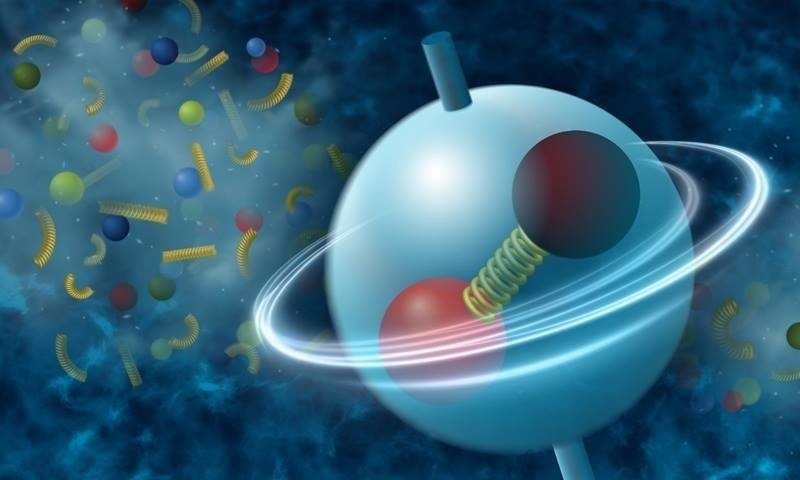
New data show that local fluctuations in the nuclear strong force in a hot soup of quarks and gluons (background) may influence the spin orientation of particles called phi mesons, a quark-antiquark pair held together by the strong force (foreground). Image Credit: Brookhaven National Laboratory
Conventional explanations for spin preference, such as the intensity of the magnetic field or the “swirliness” of the hot quark matter produced in these collisions, cannot account for it. An alternative hypothesis is that the preference could be caused by local fluctuations in the strong force, which controls interactions between quarks and gluons.
The Impact
The possibility that the strong nuclear force, sometimes known as the strong force, could influence particle spin in this manner was previously unknown to scientists. The measurements of the global spin alignment will provide researchers with a new method to examine local fluctuations in the strong force, should the findings and explanation hold up to additional investigation.
Nuclear physics’ main objective is to comprehend this force, which is the strongest and least known of nature's four basic forces. Particle colliders are used to simulate the hot quark-gluon soup of the early universe in this study.
Summary
Scientists have previously noted spin preferences for particles that have two possible spin orientations—like the north and south poles of a planet—for particles colliding at the Relativistic Heavy Ion Collider (RHIC), a Department of Energy Office of Science user facility for nuclear physics research.
Measuring the spin alignment of meson particles—which have three distinct spin orientations—was the focus of recent research. Mesons comprised of a quark and an antiquark with the same “flavor” (called phi mesons) exhibited preference, whereas other mesons did not.
The value predicted by theorists using conventional mechanisms, such as the magnetic field and the swirliness of the quark-gluon plasma, was less than what the researchers had found.
Recently, local fluctuations in the strong force inside the quark-gluon plasma were incorporated by nuclear theorists into a novel model. The STAR Collaboration data and that model agreed.
A justification for why certain mesons prefer a global spin alignment preference while others do not is provided in the new model, which is connected to the flavors of quarks that make up a meson.
This hypothesis and the method of studying local strong-force fluctuations by employing the global spin alignment of phi mesons will be tested in upcoming experiments at RHIC.
The US National Science Foundation, the Department of Energy Office of Science, Nuclear Physics Program, in addition to several other national and international organizations and agencies identified in the scientific publication provided funding for this study.
Journal Reference
Abdallah, M. S., et al. (2023) Pattern of global spin alignment of ϕ and K*0 mesons in heavy-ion collisions. Nature. doi:10.1038/s41586-022-05557-5.